We Are Geographers!
This half term, our geography topic learning is based around where we live in the world.
We started by looking at the earth and noticed the sea and land. We found out that the land is split into continents and we live in Europe.
After finding Wetherby on our map, we thought about the scale of towns, cities, countries and continents. The children labelled some concentric circle to compare the sales of these places.
We then looked more closely at the United Kingdom. We learnt about the four countries and where we can find them on a map.
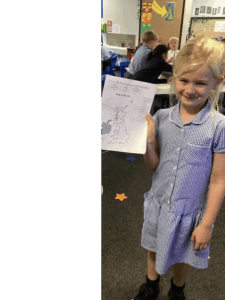
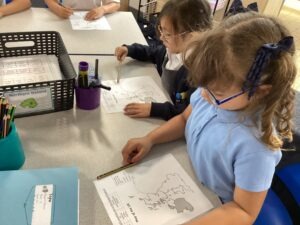
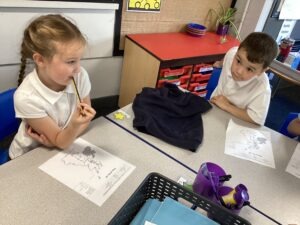
Help at home: Can you child remember the four countries that make up the United Kingdom?
Why not explore Google Earth together and find familiar places?
Welcome to Reception
A reminder that our ‘Welcome to Reception’ meeting is on Wednesday 10 September, 2025 at 6pm. This is held at school.
Following our first welcome session, this is an opportunity to find out some basic ‘need to knows’ about life in Reception.
We look forward to seeing you there.
Living and Learning: 8Rs for learning
This week, we looked at our school 8 Rs for Learning.
They remind us of the skills and attitudes that we need to help us to become the very best learners:
🌟 Responsive – listening carefully and joining in
🌟 Ready – being prepared and focused
🌟 (Safe) Risks – being brave and trying new things
🌟 Responsible – looking after our learning and behaviour
🌟 Resourceful – using things around us to help
🌟 Resilient – keeping going when it feels tricky
🌟 Remember – practising so we don’t forget
🌟 Reflect – thinking about how we did and how we can improve
We looked at some statements and decided which of the 8Rs they would be.
We need to always show our teacher we are ready. Deacon
Our recaps help us remember what we have already learnt. J
We need to take safe risks to find out if we like new things. Zubi
Help at home: Can your child tell you which of the 8Rs they have used today?
Thank you!
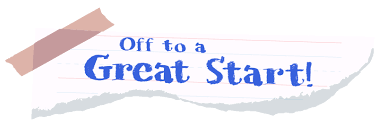 As we start the second week of Year 4, I wanted to say thank you for a great start to the year! I can tell this is going to be a great year!
As we start the second week of Year 4, I wanted to say thank you for a great start to the year! I can tell this is going to be a great year!
I’ve been so impressed with how quickly the children have settled in to their new routines. We can already respectfully and safely hand out books and equipment and collect it back in again, come in to class ready to learn and get straight in to our morning task. We really are fantastic at being cheerleaders for each other; past the initial embarrassment, they now love saying together “Wow **insert name of classmate**, you’re amazing!” when one of their peers pushes themselves to try something they didn’t believe they could do.
A few of us are still working on having our hands empty, silent voices and eyes on the speaker (which helps us all to concentrate on our learning) so we are working on that as our class target. Every time we achieve our class target we earn a shell. Every time we collect 10 shells we earn an enhancement to our end of term treat. Given how well they are doing I can see this is going to be a BIG treat!
Help at home
Ask your child what is going well for them in Year 4 and what they would like to get better at. If there is anything you or your child need help with please let me know either by email, calling me at school or at pick up. The door is always open!
Living & Learning – Our School Rules
This week we’ve been revisiting our school rules:

We shared some top tips to help us keep our school rules.
Be respectful
Remember 2 wrongs don’t make a right (Max and Arthur)
Always listen to the teacher (Lillie-Jane)
Always listen to your friends (Orianne)
Always respect nature in school (Sophie)
Use fidgets under the table so you don’t distract friends (Orianne and Sophie)
Be ready
When you hear the whistle at playtime you need to freeze. (Monty)
Stop at 2 when it is “3-2-1 stop” (Freddie)
When you hear “3-2-1 stop” you need to listen (Aria)
Be safe
Don’t stand too close to people in the line so you don’t knock them over.
Don’t stand too close to the fence. (Sophie and Orianne)
Help at home
Help at home by discussing our school rules with your child. Ask them when they find it difficult to follow the rules and how they might be able to overcome this.
Living and Learning – I Follow the School Rules
Every week, we have a Living and Learning statement (you can find them on the calendar).
To start the school year, our statement is:
I follow the school rules.
We’ve been talking about what it means to follow the school rules. A rule is something that we all agree to follow so that everyone can feel happy and healthy. Rules help us to know what to do and how to behave at school, at home and in the community.
At St James’ CE Primary, we have three school rules.
- We’re respectful
- We’re ready
- We’re safe
The children shared some ideas about how these rules might look around school.
We’re respectful
- we show kindness
- we use good manners
- we listen carefully
- we take care of our belongings
- we look after each other
- we put our hands up to speak
We’re ready
- we come to school ready to learn
- we have silent voices
- we have empty hands
- we have eyes on the speaker
We’re safe
- we make sensible choices
- we walk around school
- we use equipment properly
- we ask for help when we need
When these rules are followed, it helps our school to be a happy and healthy place to achieve and believe. They help us to feel cared for and included.
Help at home by discussing the school rules with your child. Do you have any rules at home? Can you think of any places in the community with their own special rules (perhaps a swimming pool or the library?).
Living and Learning
We have had a super start to Year 6 and the children have settled back in really well. We have had a lot of changes since last year: new classroom, smaller class size and new expectations. The children have adapted to these very well.
In Living and Learning this week we have been revisiting our school rules. We spoke about what being respectful, ready and safe looks like in our school, at home and in our community.
On a separate note, we have been very excited to welcome a new member to our school, Chip the hedgehog!
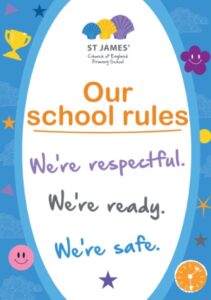
Back With a Bang (and a Few Lost Jumpers)
What a wonderful start to the new school year! Year 1 have amazed me with how ready and eager they’ve been to learn. It’s been lovely to see friends back together, sharing smiles and settling back into school life.
The classroom may look a little bit different this year but the children have embraced the changes brilliantly (even though some of the adults around school are still adjusting). They’ve worked so hard learning new routines: classroom transitions, tidying up, lining up, which way round to put on a jumper after PE…
I’m especially proud of the way the children have taken so much pride in their learning. If week 1 is anything to go by, I’m very excited for the next 38!
Well done, Year 1! You’ve certainly helped to make my first week back a happy and healthy one.
A few reminders:
- Reading books
We will continue to use the Collins Hub e-book platform though the children have new log-ins. We are currently experiencing some access issues which we’re working to fix as soon as possible. Thanks for your patience!
- NumBots
NumBots is a valuable resource and a fantastic way of keeping home learning fun. If you need any technical support (or a reminder of login details), please be in touch and I’ll try my best to help.
- PE days
Our PE days are Tuesday and Thursday.
- Water bottles
Please make sure your child comes to school with a clean, labelled water bottle every day. Water bottles must go home every day.
- Uniform
All the children have looked so smart to start this year and uniform compliance has been fantastic. We have, of course, had a great deal of jumper/cardigan admin to contend with! Please label your child’s clothes – it helps us and you. Thank you.
If you need any additional support, you can email me on ajnash@spherefederation.org
Help at home by celebrating a fantastic start to Year 1. What has your child learnt this week? What’s different about Year 1? Has anything stayed the same?
Thanks,
Mr Nash
A Brilliant Start to Year 2!
What a wonderful first week back we’ve had in Year 2! The children have returned full of enthusiasm and have already shown such a positive attitude towards their learning.
In Maths, we’ve been busy playing games to practise our number bonds. Using towers of ten cubes, one partner hid some while the other worked out how many were missing. The children also explored how ten is made up of ten ones — a really important building block for their number work this year.
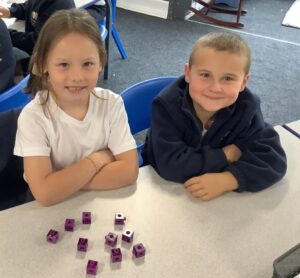
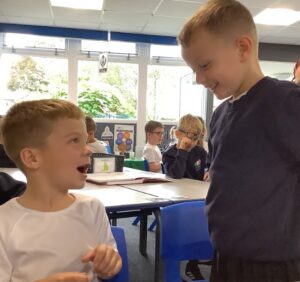
In PE, we had lots of fun with a game of Castles and Cannonballs. The children worked brilliantly in teams to build tall, careful towers before using balls with great skill to try and knock them down.
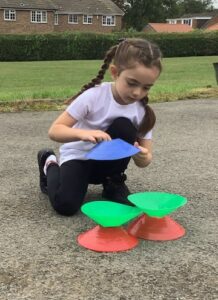
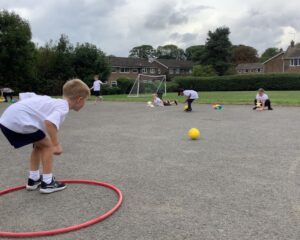
It’s been a fantastic start to the new school year, and I’m so impressed at how well Year 2 have settled back into school life. If the first week is anything to go by, we’re in for an amazing year ahead!
Living and learning: I follow the school rules.
Hello and welcome! Mr Freeman here ready for a fantastic year with a brilliant Year 5 group. So far, the children have settled back into school, and their new classroom, extremely well. Their attitude to learning is exemplary and I’m already seeing progress in just a few days (particularly with writing).
In the first week back, we always focus on getting back into school routines and following school rules, which are below:

We keep our three rules short and sweet so that children can recall them easily. Adults always refer to school rules in lessons and Year 5 follow them well consistently. In our first living and learning session, we spoke about what being respectful, ready and safe looks like in our school – here are some of the comments made by pupils:
Being ready in class is a respectful choice. – Logan
We are respectful to the feelings of others so that we can do the best learning. – Emily G
Respect your friends and peers. – Ethan
We don’t leave things on our classroom floor otherwise it might be unsafe. – Emily M
We avoid bad choices to keep us safe. Physical contact might be hurtful and unsafe to others. – Shae
Having eyes on the speaker shows that your ready. – Elara
You need to be ready because if you’re not paying attention, you might miss something important. – Lottie
Not being ready might not be safe and might impact your future. – Kiara